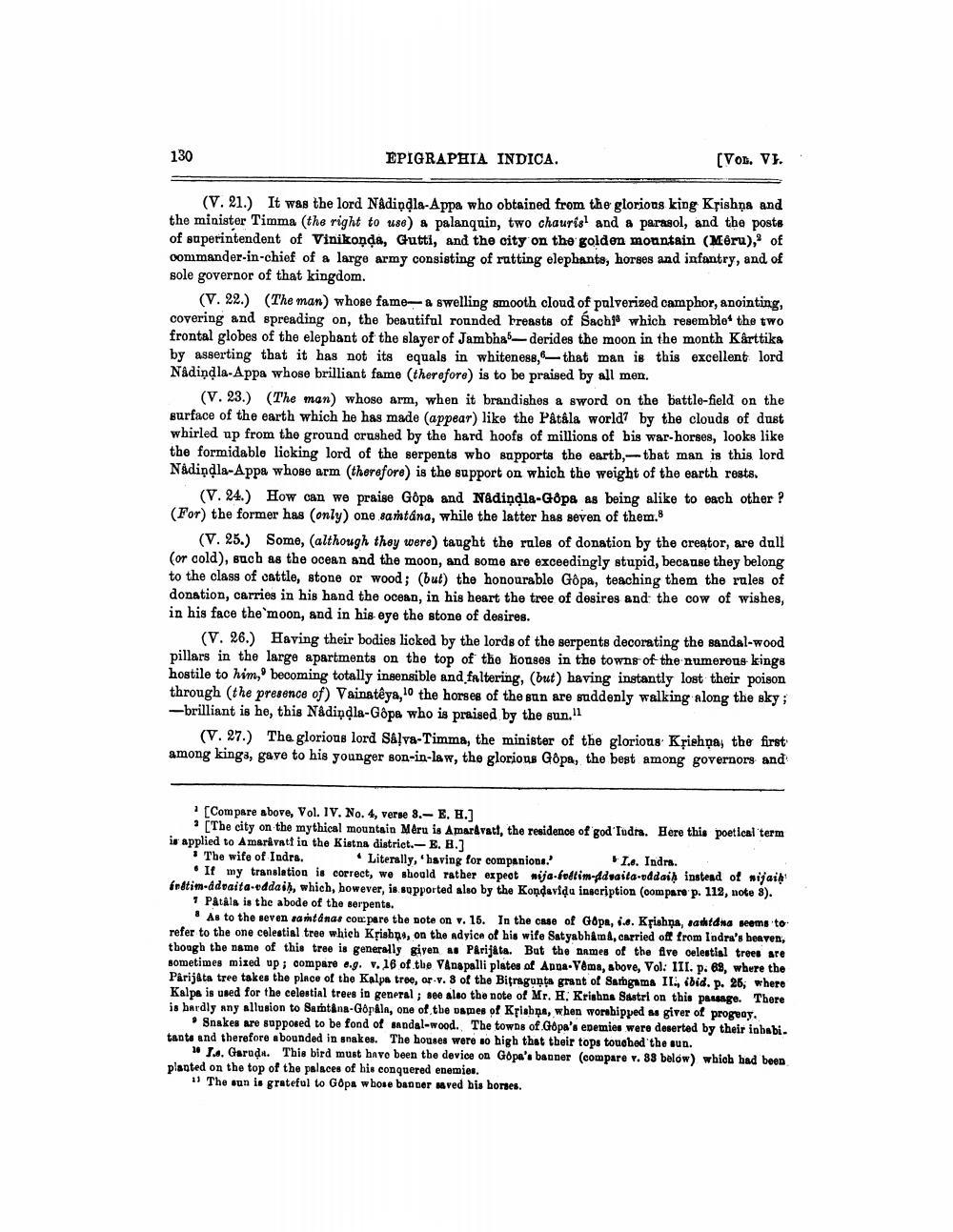________________
130
EPIGRAPHIA INDICA.
(VOL. VI.
(V. 21.) It was the lord Nadindla-Appa who obtained from the glorious king Krishna and the minister Timma (the right to u86) a palanquin, two chaurist and a parasol, and the posts of superintendent of Vinikonda, Gutti, and the city on the golden mountain (Méru), of commander-in-chief of a large army consisting of ratting elephants, horses and infantry, and of sole governor of that kingdom.
(V. 22.) The man whose fame- & swelling smooth cloud of pulverized camphor, anointing, covering and spreading on, the beautiful rounded breasts of Sachi' which resemble the two frontal globes of the elephant of the slayer of Jambha!- derides the moon in the month Kárttika by asserting that it has not its equals in whiteness, that man is this excellent lord Nádindla-Appa whose brilliant fame (therefore) is to be praised by all men.
(V. 23.) The man) whoso arm, when it brandishes a sword on the battle-field on the surface of the earth which he has made (appear) like the Påtala world by the clouds of dust whirled up from the ground crushed by the hard hoofs of millions of bis war-horses, looks like the formidable licking lord of the serpents who supports the earth, that man is this lord Nadiņdla-Appa whose arm (therefore) is the support on which the weight of the earth rosts.
(V. 24.) How can we praise Gopa and Nadindla-Gopa as being alike to each other ? (For) the former has (only) one samtána, while the latter has seven of them.
(V. 25.) Some, (although they were) taught the rules of donation by the creator, are dull (or cold), such as the ocean and the moon, and some are exceedingly stupid, because they belong to the class of cattle, stone or wood; (but) the honourable Gôpa, teaching them the rules of donation, carries in his hand the ocean, in his heart the tree of desires and the cow of wishes, in his face the moon, and in his eye the stone of desires.
(V. 26.) Having their bodies licked by the lords of the serpents decorating the sandal-wood pillars in the large apartments on the top of the houses in the towns of the numerous kings hostile to him, becoming totally insensible and faltering, (but) having instantly lost their poison through (the presence of) Vainatêya,10 the horses of the sun are suddenly walking along the sky; -brilliant is he, this Nadindla-Gôpa who is praised by the sun."
(V. 27.) The glorious lord Salva-Timma, the minister of the glorious Kšiehpa, the first among kings, gave to his younger son-in-law, the glorious Gopa, the best among governors and
[Compare above, Vol. IV. No. 4, verse 8.-E, H.]
· [The city on the mythical mountain Meru is Amar vatt, the residence of god Todra. Here this poetical term is applied to Amaravati in the Kistna district.-E..] The wife of Indra. Literally, having for companions.
"I.. Indrs. • Il my translation is correct, we should rather expect mija.fodlin.pdvaita.vddain instead of mijai frdtim-ddraita-eddail, which, however, is supported also by the Kondavida inscription (compare p. 112, note 8).
1 Pátála is the abode of the serpents.
. As to the seven santanar cowpare the note on v. 15. In the case of Gope, ... Krishna, sadna seems to refer to the one celestial tree which Ksishpo, on the advice of his wife Satyabhama, carried off from lodra's beaven, though the name of this tree is generally given as P&rijata. But the names of the five celestial trees are sometimes mixed up; compare e.g. v. 16 of the Vanapalli plates of Apga.Vema, above, Vol: III. p. 68, where the Pârijata tree takes the place of the Kalpa tree, or v. 8 of the Bitragunts grant of Samgama II., ibid. p. 26, where Kalpa is used for the celestial trees in general; see also the note of Mr. H. Krishna Sutrl on this pasange. There is hardly any allusion to Santana-Gopala, one of the Dames of Krishna, when worshipped giver of progeay.
Snakes are supposed to be fond of sandal-wood. The towns of Gopa's enemies were deserted by their inbabi. tanta and therefore abounded in snakes. The houses were so high that their tops touebed the sun.
* L., Garoda. This bird must have been the device on Gopa's banner (compare v. 88 below) which had been planted on the top of the palaces of his conquered enemies.
11 The sun is grateful to Gopa whose banner ved his horses.




